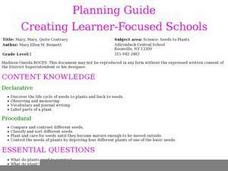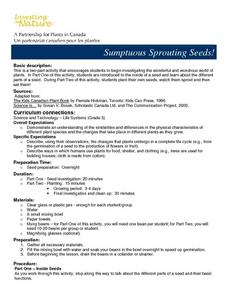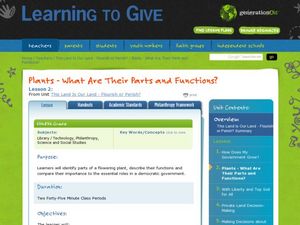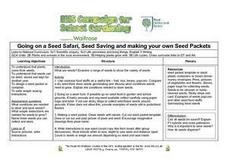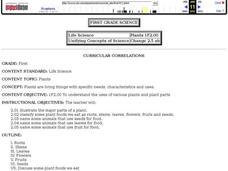Curated OER
Harvesting and Threshing the Seed
Students harvest and thresh the seeds. They count the seeds and compare that number with the original number of seeds planted (8) to determine their profit or loss. Finally, students think about additional questions they have about...
Curated OER
Science: Seeds to Plants
First graders compare and contrast different seeds before planting them. They assess the basic needs to plants and conduct experiments of deprivation of those needs. They write stories and draw pictures of plants which are bound into a...
Curated OER
Biology: Plants - The Fiber of Life
Learners, in groups, examine and list the varieties of plants and how they relate to man and the environment. They create plant books complete with leaf samples with sketches and information, grow beans in plastic baggies, and role-play...
Curated OER
Thinning and Transplanting
Middle schoolers identify and observe one plant per section in their quad and to transplant the surplus seedlings to empty quads and interpret why this is important. They then discuss the purpose of thinning and transplanting. Finally,...
Curated OER
Fiber of Life
Students examine the importance of plants to individuals and society through a multi-discipline set of activities. They observe and draw different leaf structures and then create a book about trees and photosynthesis. They explore ways...
Chicago Botanic Garden
Seasons of a Plant
The third in a series of six lessons is an engaging three-part activity defines that discusses phenology, focusing on the cyclic seasons of plants. Pupils then observe phenology outside before determining how climate change can...
Curated OER
Plant Parts
Students use "Kid Pix" to explore plants. In this science and technology lesson plan, students become familiar with plant parts and label them on a plant. Students tell the functions of each of the plant parts.
Curated OER
POLLINATION DEMONSTRATION
Third graders study the terms pollen and pollination. They use appropriate vocabulary in describing their investigations, explorations, and observations (e.g., stem, pistil, stamen, flower). They describe, using their observations,...
Curated OER
Sumptuous Sprouting Seeds!
Third graders investigate the wonderful and wondrous world of plants. They examine the inside of a seed, explore the different parts of a seed, plant their own seeds, watch them sprout and then eat them! They describe, using their...
Curated OER
Plants- What Are Their Parts and Functions?
Students learn about plants. For this plant function lesson, students label the parts of a plant and their functions. Students work in small groups to create three simile statements to relate to the function of essential plant parts....
Curated OER
Sunflowers
Students grow their own sunflower and create their own sunflower art work. In this sun flower lesson plan, students base their art work after Van Gogh and other artists that used sunflowers.
Curated OER
Going on a Seed Safari
Students describe biology by identifying different plants in class. In this seed lesson, students discuss the process of how a plant grows from seed to leaves. Students attend a field trip to their garden or another park and collect a...
Curated OER
Flowers, Pods, and Seeds
Students gain an understanding of living organisms. the complete a plant growth data log to chart plant growth and to make observations, predictions, and personal reflections.
Curated OER
Plants
Learners illustrate the major parts of a plant, classify some plant foods we eat as roots, stems, leaves, flowers, fruits and seeds. They also name some animals that use seeds, leaves, and fruit for food.
Curated OER
Plant Parts and Functions
Fifth graders examine two or three unfamiliar flowers or fruits, such as eggplant and mango and realize that each flower or fruit comes from a flowering seed plant. They then identify the plants.
Curated OER
Plant Diversity
In this nonfiction comprehension worksheet, learners read the selection on plant diversity and answer 10 questions that include true/false, short answer, multiple choice, and fill in the blank.
Curated OER
Flowers, Flowers, Flowers...A Visit with Georgia O'Keeffe
Students analyze, discuss, and research Georgia O'Keeffe and her flower paintings. They select a flower to paint and create a watercolor painting in the style of Georgia O'Keeffe. Students compose a poem describing their painting.
Curated OER
Sunflower Sundance
First graders study sunflower plants and identify its parts. They plant sunflower seeds and watch them grow and make sunflowers out of paper plates and colored paper. They watch videos and visit websites about sunflowers.
Curated OER
Kwanzaa Science
Students study the parts of a plant in order to better understand the muhindi as one of the seven symbols of Kwanzaa.
Biology Junction
Introduction to Plants
In this biology lesson, learners identify the different types and parts of the plant. They complete a crossword puzzle with 37 questions about plants.
Curated OER
Violets, Daffodils, Roses and Thorn
Fourth graders complete a variety of exercises and activities surrounding the scientific and artistic properties of the parts and processes of a plant/flower.
Curated OER
Flower Power
Pupils investigate and explain the basic needs and life processes of plants. Key concepts include: living things change as they grow and need food, water, and air to survive. The reverse of the Kansas quarter serves as inspiration.
Curated OER
Seed Diversity
Students explore agriculture by researching different seeds. In this seed identification instructional activity, students collaborate in small groups to analyze a package of different seeds. Students utilize a magnifying glass to examine...
ARKive
Butterflies and Blooms
The Northwoods of Wisconsin are lovely in the summer,and they are also home to many flower and butterfly species. Investigate the ways in which seasonal flowers and butterflies are interdependent on each other for survival with a fun...



